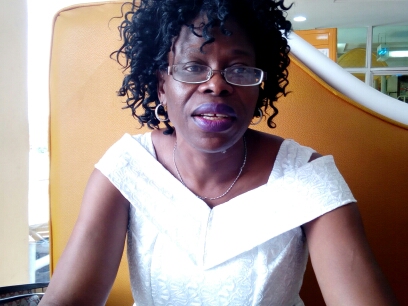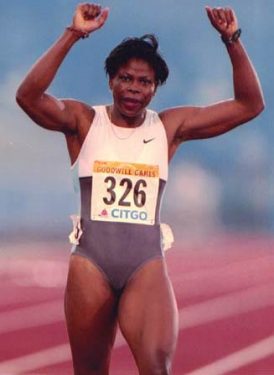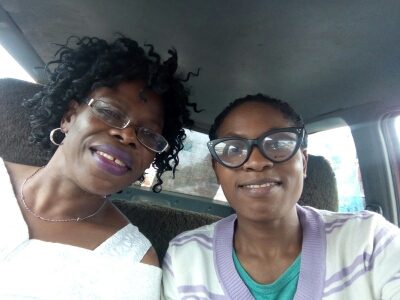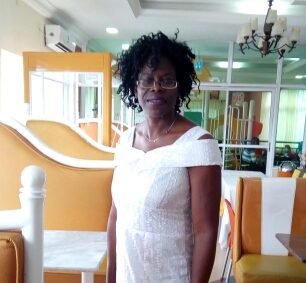On the December 5, 1968 a baby girl was born to the family of Mr and Mrs Ogunkoya in Ode-Lemo, Ogun State Nigeria. The baby girl would later grow up to become an Olympic medalist and record holder, the pride of her family, country and the continent at large. The very energetic and lively Falilat Ogunkoya spent an afternoon with Aclsports.com’s SOLA OYENIYI.

Growing up back then when every parent wanted their child to be a doctor, lawyer or an engineer; what were the challenges you faced going into athletics, if any?
My mum was worried, she was really worried because I was born a premature so she was like athletics? You want to go and run? But my dad stepped in and talked to my her to give me a chance. After that, my mum supported me and she had no other option than to pray for me. I was very happy.
How and when exactly did your journey into athletics start?
I think it started when I was in primary school. I had two step sisters and another one from my mother. We made up the relay quartet of the school. I will start and then pass to my step sisters. That was when I really started running. After that, I went to Ife for one year and thought I wouldn’t be able to do athletics again. A year after, they started a secondary school in my town Ode-Lemo so my Dad wanted me to come back and be part of the first set of the school. My games master (Dele Oladejo) who knew me in primary was posted to the new secondary school and when he saw me, he just drew a line for us all to run and I beat everybody (she laughs). As a former triple jumper, Dele Oladejo started helping and coaching me. He will go to my parents whenever we had inter-house sports in other cities.
In 1980, there was a competition in Sagamu for all secondary schools in Remo at the Sagamu stadium and I competed in 100m, 200m, long jump and 1500m. I think I did about three or four events. I was just going from one event to the other (laughing) and I was awarded the best athlete from my school that day. The athletics coach in the Sagamu stadium, John Afuwape then saw me and said: “you can run o, what is your name?”
He brought me to Abeokuta and they gave me a track suit and spike shoes. When coach Afuwape took over from Dele Oladejo I was invited to Ashiru stadium to prepare for the National Sports Festival, Bendel 1981. During the trial for Bendel 81, I wasn’t feeling alright because I saw everyone stretching, wearing spike shoes and I was a JJC. So I said coach, I’m not going to run 100m o. Why, he said? And I said these people, I don’t want to run with them let me go and do shotput. I threw shotput and he said, what are you going to do again? I replied, let me go and run 3000m (bursts out laughing) I don’t have to sprint. Then I ran the 3000m and was stopping at intervals. The coach and my games master were laughing asking why I left my 100m and 200m event? At that time I was about 16 or 17 years and didn’t have much courage so I couldn’t go to the National Sports Festival.
Guess what, in 1985 there was another sports festival and I was already matured because I got out of high school in 1983 or 1984 and I had represented Nigeria earlier in Zone 3 competition in 1984. I was selected for the competition and represented Ogun State winning 4 gold medals in 100m, 200m, 4 X 100m and 4 X 400m. The 1985 sports festival was the first real National competition I partook in. Ogun state won 9 gold medals and I contributed to 4 of them. That was when everybody was like who is that girl, she is running like Alius. Some of us were then selected for camp in Ilorin to prepare for the First World Junior Championships in Athens, this was in 1986. I won gold in 200m and Bronze in the 4 X 100m. After this feat, I got a scholarship to go to Mississippi State in 1986.

At what point would you say your career peaked?
I think my career peaked at the All African Games in 1987 because I won silver in 100m, 200m; gold in 4 X 100m, 4 X 400m but most people didn’t pay attention so everything went away and I didn’t do much after that. I went back to school running for Mississippi State as a student athlete because I was on a scholarship and graduated from college in 1992. The one that really helped me was 1996 Olympics when I gave Nigeria her first individual medal. It was a bronze in the 400m event at a record time of 49.10s for an African athlete and the record stands till today. I was also part of the quartet that won silver in the 4 X 400m in the same 1996 Olympics.
In 1998, I won gold in the Goodwill games – a feat no Nigerian has ever achieved; in the World Cup of athletics now called IAAF World I won gold in 400m and silver in 200m.
OGUNKOYA’S MEDALS’ TABLE
| Competition | Year | Event | Medals |
| National Sports Festival | 1985 | 100m 200m 4 X 100m 4 X 400m | Gold Gold Gold Gold |
| World Junior Championships | Athens 1986 | 200m, 4 X 400m relay | Gold, Bronze |
| All Africa Games | Johannesburg 1999 Nairobi 1987 Harare 1995 | 400m 100m, 200m 400m | Gold Silver, Silver Silver |
| African Championships | Annaba 1988 Lagos 1989 Dakar 1998 | 100m, 200m 200m, 400m 200m, 400m | Silver, Gold Silver, Gold Gold, Gold |
| Olympics | Atlanta 1996 | 400m 4 X 400m relay | Bronze Silver |
| Goodwill Games | 1998 | 400m | Gold |
| World Cup of Athletics (IAAF World Championships) | 1998 | 200m 400m | Silver Gold |
You’ve won numerous laurels on the national and international level, which would you say is your best and why?
It has to be the Olympics 1996 medal; because as an athlete, one of your goals is to win an Olympic medal.
Any low points in your career as an athlete?
That was when I lost my mum because she wasn’t around when I won the gold in Atlanta. It was very tough. I lost my mum in May 24, 1996 and Olympics was in two months. My coaches were skeptical if I was going to train or just cry my eyes out. When the three of them came the day after she died and asked me to train, I didn’t complain. I got my bag, trained and they said to themselves that I was going to be alright. Her death really got to me because I was her last child and she would go to the mosque and pray all day for me but when I won the Olympics, she wasn’t there.
Another low point is injuries. When you have injuries, you feel like you don’t know how to do anything.
What would you say was your biggest challenge as a Nigerian athlete?
You have to do most of the things yourself as a Nigerian athlete. Nigeria will not recognise you if you are not running well. When you are running well and a little thing happens, even the press would use words like: “flop,” “crashed.” For the government, it is only when you are running well and on top that they praise you. But when you see the British and Americans, if their athletes are coming last they will still be saying good things about him or her like ‘Oh, maybe something is happening, maybe he or she is having problems with his or her leg’ and things like that. They give them encouragement and a pat on the back. That, we don’t do here and it does get to the athletes.
There are a lot of things that our sports athletes go through that they don’t even talk about but still put in their best to win laurels. Also, after retirement there are a lot of ex-sports men and women who are not doing well. Although we were trained in my house to be goal getters and get whatever we need but I’m speaking for other ex-sports men and women, we need to take care of them.
You have to do most of the things yourself as a Nigerian athlete. Nigeria will not recognise you if you are not running well.
Talking about sponsorship, one of the biggest problems in Nigerian sports. How were you able to bag the Nike deal in the 1980s?
It was in 1987 and I was very lucky. Nike had known me in school from when I was a World Junior Champion. I was able to keep my contract with them and didn’t use any other product until 2004. They told me I had to be in the top 5 in the world to keep my contract and I was able to keep that level. I didn’t have TV rights because of my African heritage so my contract was not like that of the American athletes but they still gave me enough to keep going. In 1998, when I was ranked the best quarter-miler in the world, was a Goodwill games medalist, got medals at the World Cup of Athletics and I ran both 200m and 400m that year; that was when I made the most money and bonus from Nike as I was paid for each feat I achieved. Also, they continued to renew my contract and when I started my club they were supportive.
What was athletics in Nigeria like in your days compared to what we have now?
Then there were a lot of student athletes in America. A lot of the athletes that made it then were in America. Olympic gold medalist, Veronica Campbell went to Miami. A lot of Nigerian athletes were schooling and training in America and that really helped us. Also, during that time sport was given a little priority in Nigeria and we need to go back to that and make sport a priority. That is the only thing that unites us all.

Look at Dangote, he wants to buy Arsenal. Good! He’s a business man but he needs to help sports in the country too. Even if it’s rice or spaghetti he will give to athletes in camp or even come and support my foundation (laughs) and if he then buys Arsenal, I won’t mind because a lot of Nigerians put their money in the club. It’s a good thing to do because he has the passion for sports. This is something the corporate bodies need to do to help the athletes. When I was competing I had a doctor, a physio, a massieur, two or three other coaches that watch my workout and a manager that manages me to go to meets. This is not something the athletes can do on their own. I had to employ the services of all those people to remain top 5 in the world because Nike had already told me that was what I needed to do to sustain my contract with them.
As an ex-Nigerian athlete, why do you think ex-sports men and women in Nigeria prefer to go into coaching, own an academy or foundation, than go into sports administration?
They don’t want us! When an ex-sportsman or woman tries to get into administrative positions in the federation, that is when you will see the politicians because they have money. If you believe that I’ve been an athlete before and done very well before. Do I have to pay you? I’ve already paid you while I was running and contributed my best. Now, when I’m coming to you that I want to do this or that, they won’t allow you! They will say you are too technical, you’re too this, you’re too that. So, they prefer people that they don’t know.
Even the government, what are they doing about it? These are the people that made Nigeria proud, but when they want to take over the place, it becomes a problem. It’s only in Nigeria this thing happens o, in other climes it’s their ex-sportsmen that are in charge. It’s very difficult because we want to give back to the sports that made us but when they don’t allow us, that is when you see academies and foundations. However, we won’t stop and some of us will continue to fight and maybe one day, an ex-athlete can be a Sports Minister in Nigeria.
I lost my mum because she wasn’t around when I won the gold in Atlanta. It was very tough…she would go to the mosque and pray all day for me but when I won the Olympics, she wasn’t there.
Tell us about Falilat Ogunkoya Foundation.
I started Falilat Ogunkoya foundation in 2006. FCMB helped a few times and I thought they would continue with the sponsorship because we did discover some athletes. I was looking at a trend whereby we discover athletes who would attend meets and make it to world championships wearing kits sponsored by FCMB. But you know, when you are doing something and somebody is there, they will go to their boss and tell them something else.
It’s been very difficult to get sponsors. At the foundation we’ve done 400m meets about 3 times, all secondary schools’ competition in Oyo state while Alao Akala was governor, he supported us and I’ve done things for retired athletes too. Even at competitions, the civil servants who are entitled to pension after retirement might get $300 daily while the athletes who are forgotten after their active days get about $100 daily allowance. The foundation is all about programmes for retired athletes and grassroots athletes’ development.
Tell us about your involvement with the Nigerian sports awards.
As one of the pioneers of the Nigerian sports award is in its 6th year now. During my own days, we didn’t have anything like this and nobody recognised us. We’re doing this to appreciate the retired and active sports men and women, and we also appreciate politicians and corporate bodies who have been supportive.










